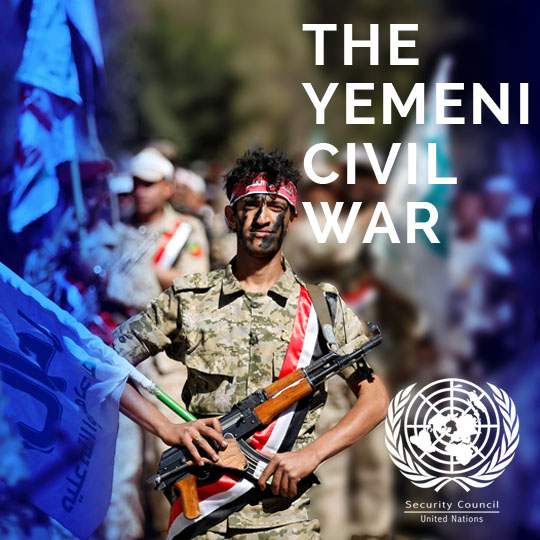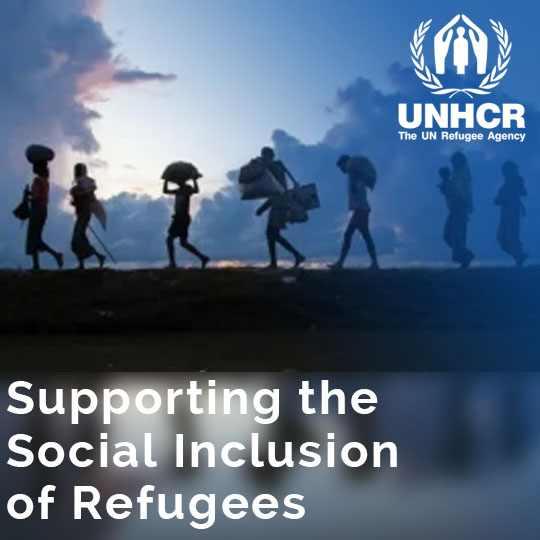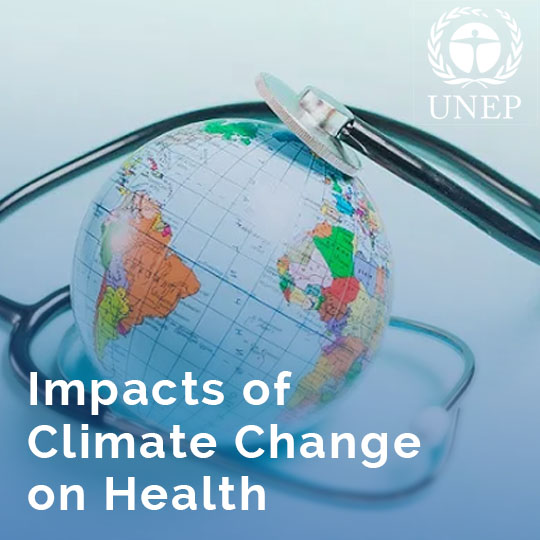Committees

United Nations Security Council (UNSC)
Topic: The Yemeni Civil War
When Houthi forces took over the capital city of Sanaa in Yemen in September 2014, the country descended into a civil war. As a result, multiple armed forces gradually replaced the central governance in Yemen, creating local centers of power, leading the country into one of the world’s worst humanitarian crises. According to recent published data, 80% of the Yemeni population requires some form of assistance, ~ 1.1 million people diagnosed with cholera and ~ 15 million Yemenis are at risk of starvation. Already in 2018, the United Nations warned that the situation could become "the worst famine in the world in 100 years”. In addition, the current COVID-19 pandemic has put another strain onto an already vulnerable population.
The UN Security Council has the primary responsibility for the maintenance of international peace and security. It consists of 15 Members, 5 of which are permanent forces (China, France, Russia, UK and USA). Each member has the right to vote but only the 5 P countries have the power to veto decisions. Under the Charter of the United Nations, all Member States are obligated to comply with Council decisions.
Delegates joining the UNSC will discuss possible actions and initiatives that the United Nations could take with relation to the Yemen Civil War. It calls upon the parties to settle a dispute by peaceful means and recommends methods of adjustment or terms of settlement.
Source:
https://news.un.org/en/story/2021/05/1091822
https://www.un.org/securitycouncil/

United Nations High Commissioner for Refugees (UNHCR)
Topic: Supporting the Social Inclusion of Refugees
In 2017, more than 25.4 million men, women and children were registered as refugees across the globe. They fled their home country fearing persecution based on their race, religion, nationality or political opinion but also being victims of ongoing wars, conflicts and military violence. Having survived the cruelties of escape, the main problem for refugees in their host countries is their alienation from communities and the nonacceptance from local inhabitants. Moreover, there is a huge lack of opportunity for education and finding suitable jobs. In addition, women and young children face a high risk of sexual assault during the transit as well as after arrival in refugee camps.
UNHCR strives to ensure the universal right to seek asylum and find safe refuge in another state, with the option to integrate or resettle. This UN agency provides critical assistance in the form of healthcare, shelter, household goods, clean water and food, as well as arranges transport and assistance for people returning home, and support income-generating projects for those who resettle. One of UNHCR’s goals is to highlight the role of refugees in their host communities as well as show the benefits of successful integration. During COVID-19, UNHCR for example featured stories of refugees who have been contributing heroically on the frontlines as doctors, cooks, soap makers and supportive neighbors.
Delegates who represent a country in the UNHCR will discuss projects to support the social inclusion of refugees in today's society. Moreover the debate focuses on initiatives on how the UNHCR can provide emergency assistance in times of displacement during an ongoing pandemic and how integration will look like post-corona.
Source:
https://www.unhcr.org/
https://www.unhcr.org/what-we-do.html

United Nations Environment Programme (UNEP)
Topic: Impacts of Climate Change on Health
Past predictions from scientists about the impact of global climate change have long become true: shrunken glaciers, increase of extreme weather phenomena like droughts or floodings, and steadily rising temperatures. Human activity, both direct and indirect, has altered the composition of our global atmosphere tremendously. The resulting change in climate extremely affects countries for example on the African continent in terms of food insecurity, which in turn has significant negative impacts on the social determinants of health. Roughly 90% of the population in sub-Saharan Africa depends on rain-fed agriculture but with altered natural rain cycles the food supply can nowadays not be ensured.
Climate change will heavily influence our future life and health quality. Delegates joining the UNEP will debate about the role of environmental protection with regards to securing the health of our global community. The discussion will revolve around finding solutions for existing environmental problems like the immense loss of biodiversity or rising water pollution and how it impacts global health issues.
Sources:
https://www.unicef.org/esaro/Climate_Change_in_Africa
https://edition.cnn.com/specials/world/cnn-climate
https://edition.cnn.com/2021/02/22/business/flood-insurance-climate-change-risk-first-street-foundation/index.htm
